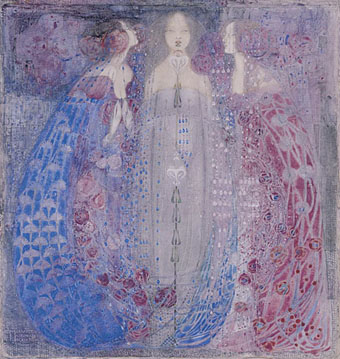The Three Perfumes (1912) by Margaret Macdonald Mackintosh.
• “…we have empowered this monopoly to strike fear into the hearts of authors. And that may be unprecedented in history. Through our own complicity as consumers, their market share only grows.” Dave Eggers talking to Rachel Krantz about the dominance of Amazon, and his new novel, The Every.
• “People will readily flock to yoga and Pilates classes, but how many show up for soundscape therapy or take a sound-walk?” Bernie Krause on the healing powers of quietude, the Ba’Aka tribe, and Japanese forest bathing.
• “Difficulty is my drug of choice, I guess.” Dennis Cooper (again) talking to Troy James Weaver about his new novel, I Wished.
• At Wormwoodiana: Mark Valentine reviews Shadows of London by Jonathan Wood.
• Robert Fripp’s drive to 1981: Joe Banks on Discipline and the return of King Crimson.
• End times and rapture: Ken Hollings remembers Richard H. Kirk.
• Daniel Spicer on The Strange (Parallel) World of Miles Davis.
• Mix of the week: XLR8R Podcast 715 by Uffe.
• Steven Heller’s font of the month is Oposta.
• Perfumed Metal (1981) by Chrome | Ode To Perfume (1982) by Holger Czukay | Perfume (2006) by Sparks


I thought that Daniel Spicer piece on Miles was really awful, particularly his dismissal of all of Miles’ 80s work, but I also thought the basic idea was lame and the alternatives either obvious or underwhelming. And a statement like this is just factually inaccurate “When Miles re-emerged into public view in 1980, he was clean, healed and seemingly back on track.” He wasn’t healed and was noticeably exhausted and weak. Likewise, “Add three-and-a-bit years of escalating cocaine use and spiralling mental health issues to the amped-up vibe of Live-Evil and you end up with the snarling intensity of Dark Magus.” is ungenerous – a key issue for Miles was the huge amount of pain he was in after his Ferrari crash, that and sickle cell, the cocaine was probably self-medication. I even wrote to John Doran to offer him an article on 80s highlights in response. Haven’t heard back though haha.
Not sure if you’re subscribed to Perfect Sound Forever, but part two of the Hassell special has just published and it’s full of interesting detail, much more so than part one. You can find it here: http://www.furious.com/perfect/jonhassellrip2.html. Includes the sad observation by Rick Cox that JH wasn’t able to play in the last years of his life which confirms my strong suspicion about those two last records being patchworks of prior performance.
Richard H. Kirk RIP indeed.
Yeah, I disagreed with a lot of it but I linked to the article since it might provide tips for people trying to navigate the huge discography. I doubt The Quietus would let anyone write a reply to it unless they were the ghost of Miles Davis.
Thanks for the JH link, I’d not seen that new piece. I think he said to me that he was having trouble performing. Our last communications were shortly before Listening To Pictures was released. He wanted me to design the album but Warp didn’t want me to, after which they had trouble coming up with a design he was happy with. I still regard the last two albums as serious compositions, more like The Vertical Collection than anything else.
If I don’t get a reply to my suggestion from The Quietus, yes highly likely, I might ask Perfect Sound Forever if he’s interested. A long time ago I co-ordinated this sort of collage piece about Kip Hanrahan there: https://www.furious.com/perfect/kiphanrahan/index.html. I did ask Jason who publishes PSF if he’d consider removing the parts about the last months of JH’s life from Rick Cox’s account, but he politely refused. I feel it doesn’t add anything and is kind of distressing.
As to those last two albums, I’m still struggling with them and like, but haven’t learned to love them yet. I keep trying and do find them interesting, but also find his absent presence haunting and unsettling. I think it may have to do with my love of his unique instrumental voice/mind/heart. It’s a good suggestion to consider it alongside the Vertical Collection.
I’m sorry that Warp didn’t want you to do the design, that’s a real shame. The design of LtP is okay, but not the standard of Maarifa at all.
I’d have preferred something more like his later live recordings but that’s just the way things worked out. I always used to make a point of describing him as a composer and musician to emphasise his being more than just a trumpet player and session musician. His earliest composition was a Buchla drone piece, Solid State, that’s as much a conceptual work as anything else. Everything he did had a conceptual basis behind it, even Fascinoma so I see the last two albums (really a single album in two parts) as a continuation of this.
I was always very flattered (and surprised) that he respected my views as much as he did. I think he valued my understanding of the thinking behind his music, we didn’t have to spend a lot of time explaining stuff to each other. The problem with Warp (as far as I could tell) was that they didn’t seem to get this at all, so the initial designs didn’t look bad but they weren’t right for the album. At least things worked out in the end.